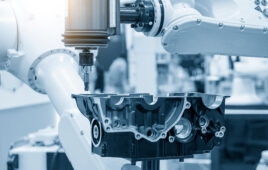Today’s original equipment makers find themselves at the intersection of Industry 4.0 technology and craftsmanship in training workers.
Italian companies have long been admired for their craftsmanship and respect for the expertise of their workers. Workforce training is an integral part of their culture. Today, as electronic technologies transform how machines are designed and built, training is evolving to keep skills aligned with new machine capabilities.
Merging Artistry, Technology
Since its birth in the early 1900s, when the Biella region of northern Italy was establishing itself among the most important textile districts worldwide, BONINO CARDING MACHINERY has developed a leadership position in the carding industry. This reflects its commitment to excellence, born of true artistry but equipped with the best electronic systems on the market.
The combination of mechanics and electronics results in increasingly automated and interconnected production models, with intelligent processes and communicating devices that allow greater performance in terms of productivity and energy savings.
Bonino’s philosophy of “tailor-made” equipment is aimed at making machines “speak” to aid their use by operators. In addition, the company also designs software that provides constantly updated production data that can be analysed in real time by the customer’s business units. This translates into leaner and more fluid work processes.
Remote control and tele-assistance services play a crucial role in what Bonino means by the offer of not only superior technology, but also an eye of care for the customer, respecting what is the most human part of the company’s work.

Bonino carding machines
Training skilled workers
Construction is a highly competitive business that requires learning and implementing new customer solutions as fast as the industry is changing. SOILMEC SpA trains workers for the next generation of powerful machines and data-driven services, drawing on its 50-year global history in the deep foundations market.
Promoting quality in education has always been a priority for the company. It supports training and skills development at all levels and job roles. The Foundations Technology Academy (FTA) started as an international training center for ground engineering professionals in 2006. Today FTA helps address construction challenges and piling needs through hybrid and simulation-based educational programs. This facilitates sharing best practices and encourages digital adoption to ensure safety, quality and sustainability in worksites around the world.
Courses are available in different formats to ensure accessibility and ease of use, including classroom teaching, e-learning, field practical training, simulation programs and coaching. By utilizing the data coming from on-board devices, FTA enables intelligent machine control to increase operational safety, equipment lifetime and availability.

Soilmec operator
Smart tools
FERRARINI & BENELLI Srl is a leading Italian manufacturer of Corona surface treatment systems, in business since 1965 and based in Romanengo (Cremona), Italy. Corona treatment is aimed at improving the characteristics of adhesion and wettability on a wide range of substrates, including plastic and metallized films, plastic-coated paper, sheets, foil, laminates, labels, and every substrate used in flexible packaging or in special applications.
Corona treatment systems are formed for each application (extrusion, printing, converting, as well as any application of flexible packaging processing) and digital generators. Evo Smart, a new digital generator equipped with a touch screen HMI display and user-friendly interface, has been developed to reach the power needed to process any type of substrate at the highest line speeds.
The multilingual and easily browsable navigation system allows for immediate management of all working parameters and enables real-time monitoring of production data from many devices. Owing to the innovative characteristics of the system, data may be stored on SD cards for downloading to a computer via USB stick or be connected to the FB Cloud Platform, where customers and technicians can monitor production in real time and provide assistance and maintenance advice.

Ferrarini & Benelli polimetal model
Evolving Glass
The glass industry is constantly evolving as the needs of customers, the imagination of architects and market requests change. One thing does not change, however: The processing of tempered glass is always very difficult to standardize because the dimensions, thicknesses and characteristics of the glass are always different. The recent energy crisis has also prompted many glassworks to look for machines with low energy consumption.
This evolution requires major efforts on the part of machinery manufacturers, who must constantly update their products, the workers who design and build them, and the customers who buy them and use them in their daily work.
“Listening is the basis of all our work,” says Giulio Dalla Costa, chief designer at MAPPI GLASS COMPANY. “You cannot design an oven if you have not experienced the daily life of the glassworks from inside and if you have not fully understood the needs. When I add a new person to our staff, the first thing I look at is not the curriculum but the passion, the desire to understand, to learn, to innovate.”
The training of technicians and specialists who deal with the construction and maintenance of Mappi hardening furnaces is a daily activity. Specialist courses, study trips to glassworks to get to know every aspect of the work, sharing meetings and direct interaction with customers, are just some of the stages of a work that never ends, because the glassware system has many elements of variability and big areas for improvement,” explains Giulio.

Glass training
Advancing Packaging
MOSS Srl specializes in printing and finishing equipment for primary rigid packaging. Established in 1967 in Reggio Emilia, in the heart of the Italian packaging valley, the company offers screen-printing and dry-offset machinery suitable to process a wide variety of plastic and aluminum items and containers.
With more than 50 years in the global packaging market, MOSS has developed several solutions to respond with flexibility to the dynamics of vast and highly segmented markets, including beverages, luxury makeup, cosmetics, industrials, and pharmaceuticals. Its machines incorporate state-of-the-art technologies and the use of LED curing technology and efficient power management to reduce their environmental impact.
Advanced servo-controlled machines have CNC capabilities and motion control functions that help operators in the use and maintenance of the machine and expedite changeover operations. All MOSS machines have connectivity features that allow remote access, simplifying information management and reducing the time and cost of assistance and troubleshooting. Dedicated in-person training helps customers with the use of machines, inks, printing techniques and related technologies. The company’s remote education programs have proven to be an efficient mentoring tool.
The opening of a subsidiary branch, MOSS North America Inc. in Sunrise, FL, will enable focused customer support and spare parts service throughout North America.

MOSS UV-LED
Changing economics
Recent surveys by the Study Center within ASSOMAC, the National Association of Italian Manufacturers of Footwear, Leathergoods and Tanning Technologies,
reveal how manufacturing production processes are reconfiguring from the pandemic and recent economic crisis. This reconfiguration is being affected by a series of both macroeconomic and microeconomic factors. Disruptions between economic blocs, climate change, the fragility of supply chains, changing online consumer purchasing behavior, efforts to develop new ways to attract consumers and the Internet of Things (IoT) are all contributing to economic and social change.
The transition towards a sustainable, responsible, and transparent production model has already started in an irreversible way. Institutions and public opinion in developed countries have taken positions that are rapidly directing regulations, technological investments, and finally demand consistent with global objectives of environmental and social protection.
It is impossible to ignore the estimated data: the enlarged fashion and clothing sector is held responsible for the second largest contribution to CO2 production and the second largest consumption of fresh water in the world. It also employs about one-sixth of the world’s entire workforce, while accounting for a much smaller fraction of global GDP.
Two considerations and two consequent economic and technological challenges can be deduced. The first consideration is that labor productivity (80% made up of female workers) is much lower than the average of other sectors. The second is that the current model of production, distribution and consumption is environmentally unsustainable.
The resulting need is to progressively free hundreds of millions of workers from activities with low productivity, and often with a high risk of exposure to disease, through automation and artificial intelligence applied to all production and distribution processes.
The second challenge is to adopt recovery, recycling, and reuse systems with a view to the circular economy, for the entire supply chain. This will also require a massive use of new technologies, coordinated a cultural maturation of all the players in the sector.
Assomac represents Italian manufacturers of machineries and technologies for fashion, automotive, shoes, leather goods and upholstery manufacturing industries. Associated companies are aware of the difference they can make in terms of global challenges for sustainability because they are able to provide technological solutions helpful to direct production processes towards a lower environmental impact and better social development.
Training New Workers
Among the many Italian trade associations that are helping their member companies prepare for Industry 4.0 and the related worker training that will be required are AMAPLAST, the Italian Plastics and Rubber Processing Machinery and Moulds Manufacturers Association, GIMAV, the Italian Association of Glass-Processing Machinery, and UNACEA, the Italian Construction Equipment Association.
From textile machinery to construction equipment, from the creation of packaging materials to glass, Italian companies are combining technology leadership with the human side of manufacturing. This respect for workers includes a focus on training them in their craft and to understand the tools that will make it easier to do their jobs in next-generation equipment.
Filed Under: SPONSORED CONTENT




